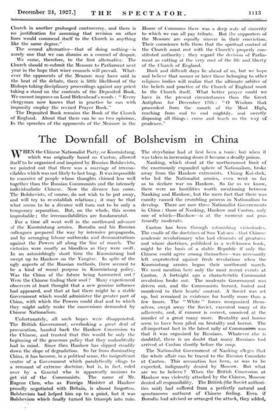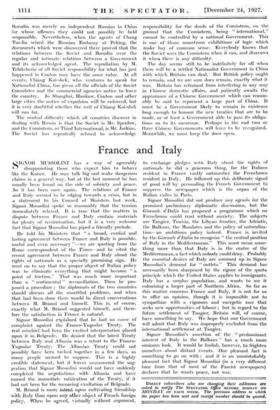The Downfall of Bolshevism in China
WHEN the Chinese Nationalist Party, or Kuomintang, which was originally based on Canton, allowed itself to be organized and inspired by Russian Bolshevists, we pointed out that there was a marriage of irrecon- cilables which was not likely to last long. It was impossible to conceive of people whose thoughts chimed less well together than the Russian Communists and the intensely individualistic Chinese. Now the divorce has come. The Bolshevists, of course, do not wish to be put away, and will try to re-establish relations ; it may be that what seems to be a divorce will turn out to be only a temporary separation. But, on the whole, this seems improbable ; the irreconcilabilities are fundamental.
For a time all went well in the northward advance of the Kuomintang armies. Borodin and his Russian colleagues prepared the way by intensive propaganda, and by arranging labour outbreaks and demonstrations against the Powers all along the line of march. The victories were mostly as bloodless as they were swift. In an astonishingly short time the Kuomintang had swept up to Hankow on the Yangtze. In spite of the ugly • aspects of the Russian methods, there seemed to be a. kind of moral purpose in Kuomintang policy. Was the China of the future being hammered out ? Were the Chinese finding their soul ? Many experienced observers at .least thought that a new genuine influence had appeared, and that at last there might be a stable Government which would administer the greater part of China, with which the Powers could deal and to which they might safely make the concessions demanded by Chinese Nationalism.
Unfortunately, all such hopes were disappointed. The British Government, overlooking a great deal of provocation, handed back the Hankow Concession. to the Chinese, and trusted that this would be only the beginning of the generous policy that they undoubtedly had in mind. Since then Hankow has slipped steadily down the slope of degradation. So far from dominating China, it has become, in a political sense, the insignificant centre of a Government which paralytically clings to a remnant of extreme -doctrine, but is, in fact, ruled over by a General who is apparently anxious to :get, -rid of the Communists. The name of Mr. Eugene Chen, who as Foreign Minister at Hankow • proudly negotiated . with Britain,. is almost forgotten. Eolshevism had helped him up to a point, but it was Bolshevism which finally turned his triumph into ruin. The strychnine had at first been a tonic, but when it was taken in increasing doses it became a deadly poison.
Nanking, which stood at the northernmost limit of the enormously expanded sphere of Nationalism, broke away from the Hankow extremists. Chiang Kai-shek, who led the Nationalist armies, even went so far as to declare war on Hankow. So far as we know, there were no hostilities worth mentioning between Nanking and Hankow, but the mere fact that there was enmity caused the crumbling process in Nationalism to develop. There are now three Nationalist Governments in China : those of Nanking, Hankow and Canton, only one of which—Hankow—is at the moment not pro. f essedly moderate.
Cantpn has been through astonishing vicissitudes. The cradle of the doctrines of Sun Yat-sen--that Chinese academic revolutionary who had elements of greatness and whose doctrines, published in a well-known book, might be the basis of a stable Republic if only the Chinese could agree among themselves—was necessarily left unprotected against fresh revolutions when the Kuomintang armies began their northward march. 'We need mention here only the most recent events at Canton. A fortnight ago a characteristic Communist revolution broke out. The moderate Government was driven out, and the Communists burned, looted and murdered to their hearts' content. A Soviet was set up, but remained in existence for hardly more than a few hours. The " White " forces reorganized them- selves, swept away the Soviet, executed many of its adherents, and, if rumour is correct, connived at the murder of a great many more. Brutality and horror seem to have been piled on brutality and horror. The all-important fact in the latest rally of Communism was that it was organized by Russians. Whatever else is doubtful, there is no doubt that many Russians had arrived at Canton shortly before the coup.
The Nationalist Government of Nanking alleges that the whole affair can be traced to the Russian Consulate at Canton. This accusation has been, as was to be expected, indignantly denied by Moscow. But what are we to believe ? When the British Concession at Hankow was violently attacked by the Chinese, Moscow denied all responsibility. The British (the Soviet authori- ties said) had suffered from a perfectly natural and spontaneous outburst of Chinese feeling. Even if Borodin had advised or arranged the attack, they added, Rorodin was merely an independent Russian in China for whose offences they could not possibly be held responsible. Nevertheless, when the agents of Chang Tso-lin seized the Russian Embassy at Peking, the documents which were discovered there proved that the relations between the Soviet and Borodin were the regular and intimate relations between a Government and its acknowledged agent. The repudiation by M. Tehitcherin of all Soviet responsibility for what has just happened in Canton may have the same value. At all events, Chiang Kai-shek, who ventures to speak for Nationalist China, has given all the officials of the Soviet Consulates and the commercial agencies notice to leave the country. In Shanghai, Hankow, Canton and other large cities the notice of expulsion will be enforced, but it is very doubtful whether the writ of Chiang Kai-shek will run far.
The central difficulty - which all countries discover in dealing with Russia is that the Soviet is Mr. Spenlow, and the Comintern, or Third International, is Mr. Jorkins. The Soviet has repeatedly refused to acknowledge responsibility for the deeds of the Comintern, on the ground that the Comintern, being "international," cannot be controlled by a national Government. This is one of those monstrous exhibitions of logic which make hay of common sense. Everybody knows that the Soviet uses the Comintern when it can, and disavowS it when there is any difficulty.
The day seems still to be indefinitely far off when there will be a settled Nationalist Government in China with which Britain can deal. But British -policy 'ought to remain, and we are sure does remain, exactly -what it was. Britain has refrained from interfering in any way in Chinese domestic affairs, and patiently awaits the appearance of a Chinese Government which can reason- ably be said to represent a large part of China. It must be a Government likely to remain in existence long enough to honour the new treaties that are to be Made, or at least a Government able to pass its obliga- • tions on to its successor. Perhaps in the end two or- three Chinese Governments will have to be recognized. Meanwhile, we must keep the door open.































 Previous page
Previous page